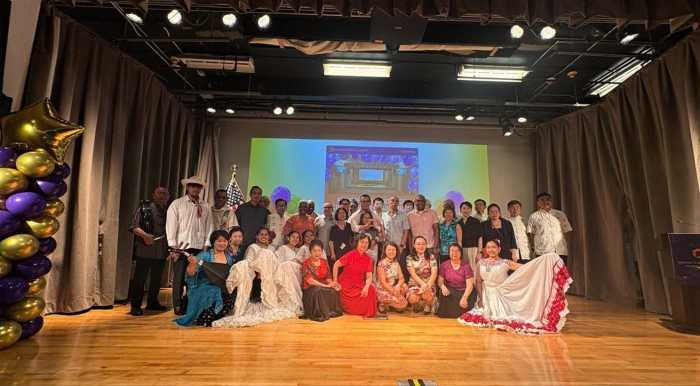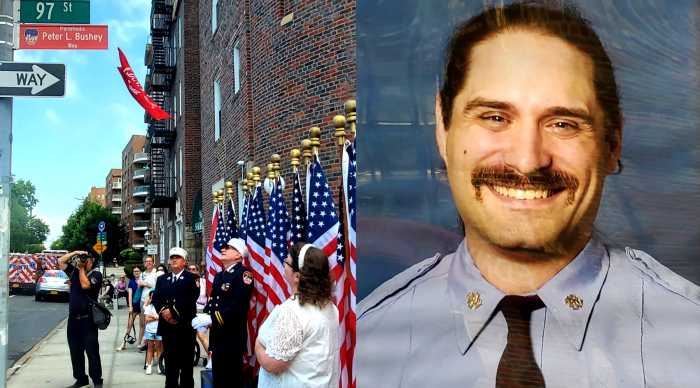By JERRY TALLMER
Natasha Richardson speaks about playing one of the iconic female roles in American theater
A 35-year-old woman in the midst of a devastating crackup looks back on the 16-year-old girl she was when – “All at once and much, much too completely” — she fell in love with, and married, a boy who had “something different” about him –“a nervousness, a softness, tenderness which wasn’t like a man’s although he wasn’t the least bit effeminate looking …”
His name we don’t know. Her name was – will always be – Blanche DuBois.
“I didn’t know anything,” Blanche Dubois declares, “except I loved him unendurably but without being able to help him or help myself.” Then one day she had “suddenly [come] into a room that I thought was empty – which wasn’t empty, but had two people in it . . . the boy I married and an older man who had been his friend for years.”
That night, on the dance floor, unable to stop herself, she loudly exclaimed: “I know! I saw! You disgust me!” – and the boy, her husband, broke and ran, out of the Casino, to the lake, and shot himself through the head.
This whole gorgeous play, burnt into our minds and souls for 58 years now, revolves around one other line that Tennessee Williams gives Blanche DuBois to say … to throw into the teeth of Stanley Kowalski:
“Deliberate cruelty is not forgivable. It is the one unforgivable thing in my opinion and it is the one thing of which I have never, never been guilty.”
“Yes,” said Natasha Richardson, the Blanche DuBois of the Roundabout production of “A Streetcar Named Desire” at Studio 54 on Broadway, “it WAS cruel, of course, what she did, an act of cruelty, killing the person she loved. But it was out of the moment. It wasn’t deliberate. She hadn’t thought about it before . . . ‘premeditated’ is the word I’m looking for.
“We can all understand one another or MISunderstand one another, but I agree that THAT” – deliberate cruelty – “is not forgivable.”
Does the actress who also starred in these very premises as Sally Bowles of “Cabaret” (won a well-deserved Tony for it) think homosexuality should have been such a big deal?
“You have to remember that ‘Streetcar’ came out in 1947, when it was not as acceptable or even as understandable a thing to be.”
Okay, but even in 1947 would Blanche have been quite so outraged?
Natasha Richardson, looking like a million dollars in a gleaming white pants suit, soft semi-blonde hair, and ropes of pearls, said with a bit of a laugh: “All I know is if I walked in on my husband with another woman, I know what MY reaction would be – let alone a 16-year-old in 1947 walking in on her husband and another man.”
Her husband is Liam Neeson. Eleven years ago, shortly after they’d met and co-starred and fallen in love in Eugene O’Neill’s “Anna Christie,” here in New York, a famous British man of theater, Sir Peter Hall, had “asked me to play Blanche and Liam to play Stanley” in a “Streetcar” Sir Peter would put on stage. “But Liam didn’t want to do it, and I didn’t feel remotely ready to play Blanche. Tennessee wrote her as 35. I wasn’t 35. I was 30.”
That was then, this is now, 11 years later. The director of this “Streetcar” at Studio 54 is Edward Hall, son of Sir Peter Hall, and Natasha Richardson and Liam Neeson are the parents of Micheal, 9, and David, 8.
The roster of tormented ladies in her acting portfolio includes Zelda Fitzgerald, Patricia Hearst, Mary Shelley, Catherine Holly of Tennessee Williams’s “Suddenly Last Summer,” Annie Christie, Sally Bowles … and now, the most besieged of all, Blanche DuBois.
“I’ve never before tackled anything of this size and range, period. I’ve had tough [assignments] before but not when I had two school-age children.” To keep some sanity while playing so close to insanity, she’s had a small separate hideaway office apartment in which to learn lines and take refuge a couple of nights a week.
Liam Neeson, by the way, is giving on current screens what this writer happens to feel is one of Neeson’s best performances in years as Alfred Kinsey, the bow-tied sexual researcher whose entire lesson was: Anything goes.
“Interestingly enough,” Mrs. Neeson said, “Liam yesterday showed me some correspondence between Alfred Kinsey and Tennessee Williams. Kinsey was very interested in ‘Streetcar,’ and wanted to get case studies of every member of the cast!” – Marlon Brando, Jessica Tandy (and/or Vivien Leigh), Karl Malden, Kim Hunter. Probably of Elia Kazan too.
Our newest Blanche did see the Jessica Lange/Alec Baldwin “Streetcar” of some few seasons ago, and has more than once in her life seen the 1951 film, “but it’s a little too vivid, so during my reading and research for this job, I decided NOT to see it again.”
A new movie of her own is “Asylum,” a thriller that at one time was to be directed by Jonathan Demme (it ended up being directed by David Mackenzie). “When Jonathan was to do it, he said to me: ‘Why do you want to play women who go to such a dark place, over the edge?’ I said: ‘Because there but for the grace of God … ’ ”
Natasha Richardson is, as the world knows, at least the world of theater and film, a granddaughter of Michael Redgrave and Rachel Kempson and one of the two daughters (the other is sister Joelly) of Vanessa Redgrave and the late Tony Richardson, director of, among much else, the never-to-be-forgotten performance of Laurence Olivier in John Osborne’s “The Entertainer.”
Back to square one: that 16-year-old girl and the sensitive, high-strung boy she adored. “There are some things I can’t talk about,” the actress said, “and other things that come out in this show seven nights a week at Studio 54.”
Your father, Miss Richardson –
“Was bisexual, yes … I think I was about 11 when I found out … when it really hit home.”
And you —
“I’m ashamed to say I was shocked and upset. Children don’t want their parents to be different from all other parents.”
That’s not cruelty. That’s childhood.
Photo of Natasha Richardson: courtesy Round About Theater.






































